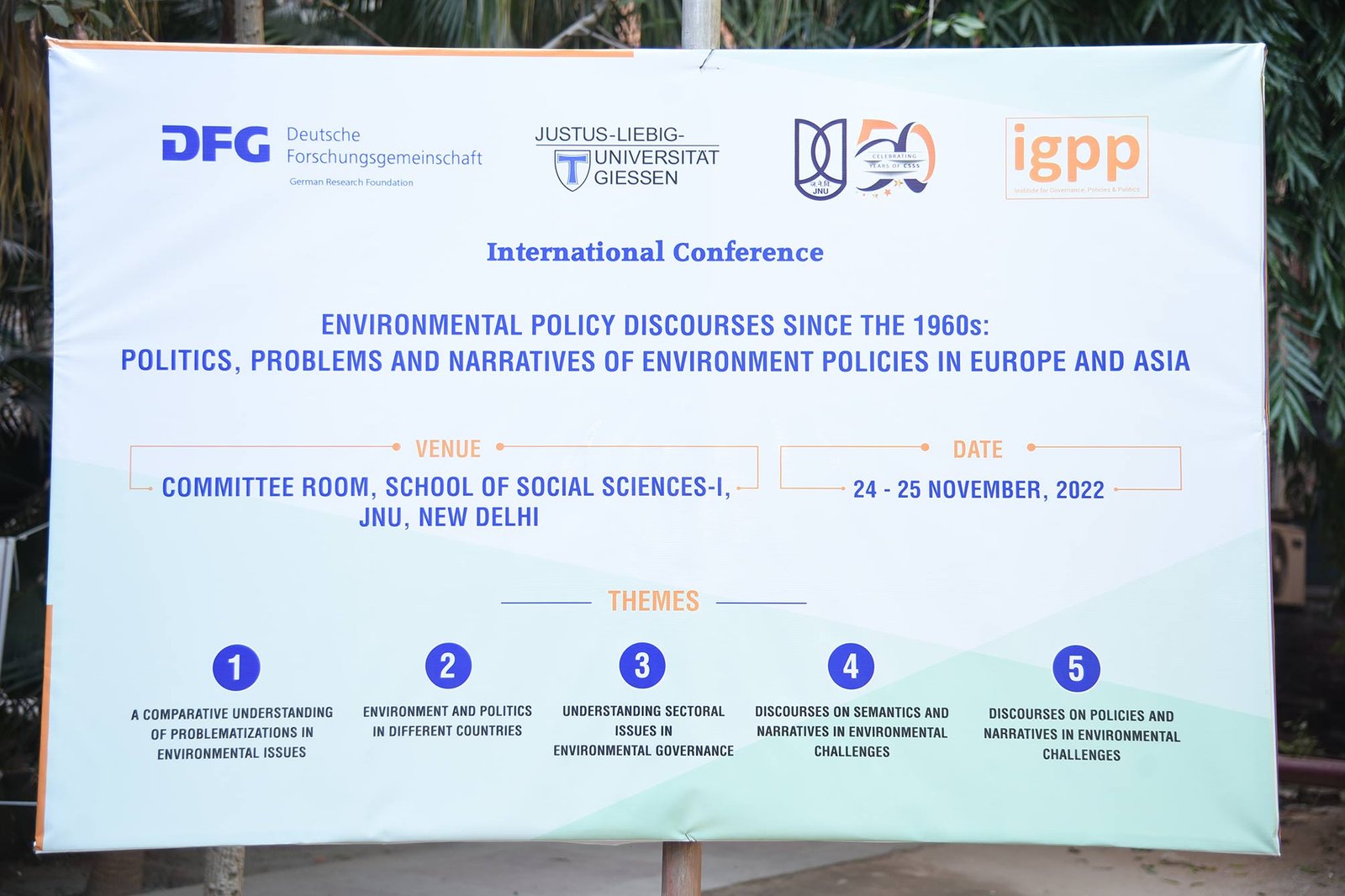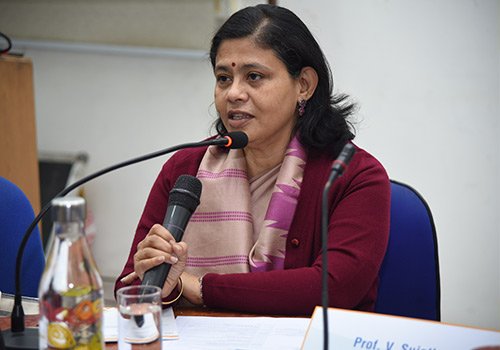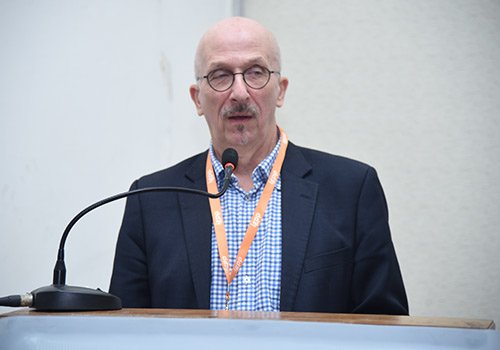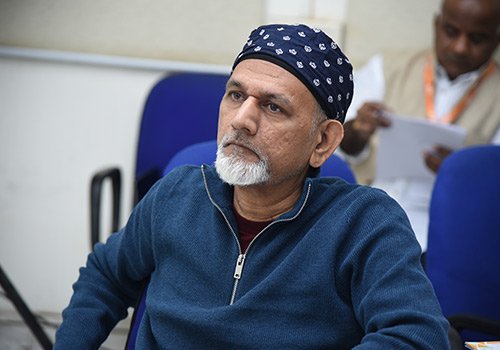
‘International Conference on ENVIRONMENTAL POLICY DISCOURSES SINCE THE 1960S: Politics, Problems and Narratives of Environment Policies in Europe and Asia’
About the Conference
Institute for Governance, Policies & Politics (IGPP), in collaboration with the German Research Foundation, Bonn, Germany, Liebig University Giessen, Germany and Jawaharlal Nehru University, New Delhi, organized an international conference on the topic “Environmental Policy Discourses since the 1960s: Politics, Problems, and Narratives of Environment Policies in Europe and Asia” on 24th & 25th November 2022, at Jawaharlal Nehru University, New Delhi.
Academicians, policy-makers, researchers, and other experts from across the globe presented their papers and chaired sessions during the international conference in an attempt to bridge narratives and enquire into the discourses of environmental policies that have governed Europe and Asia since the 1960s. Although the politics in these two different parts of the world present different trajectories through history, climate change and environmental challenges remain a problem that requires a solution in truly global proportions.
The objective of the Conference
The conference attempts to compare policies and bridge narratives of environmental discourses across Europe and Asia to arrive at a better understanding and solution in policies for environmental challenges.
Themes
- A comparative understanding of the problematization in Environmental Issues: Environment and Politics in different countries.
- Environment and Politics in different countries
- Understanding sectoral issues in Environmental Governance
- Discourses on Semantics and Narratives in Environmental Challenges
- Discourses on Policies and Narratives in Environmental Challenges
The event, “Environmental Policy Discourses since the 1960s: Politics, Problems, and Narratives of Environment Policies in Europe and Asia”. It had five sessions over a period of two days.
Day 1: 24th November 2022
Inaugural Session

Welcome Address: Prof. Vivek Kumar, Chairperson of the Centre for the Study of Social Systems, Jawaharlal Nehru University.
Remarks by: Rector, Jawaharlal Nehru University
About the Conference : PD. Dr. Dr. Detlef Briesen.
Keynote Address: Prof Anand Kumar, Retired Professor, Centre for the Study of Social System, Jawaharlal Nehru University. Remarks by LDA Chairman.
Address by: Dean, School of Social Sciences, Jawaharlal Nehru University.
Vote of Thanks: Dr. Asheesh Kumar
Session I :
A Comparative Understanding of Problematizations in Environmental Issues
Key questions of the session:
- How are the issues of the environment problematized in different countries around the world?
- Who are the stakeholders involved?
- What are the different methods/strategies used by different stakeholders?

Chair: Prof. V Sujatha
Speakers
Hanoi University of Social Sciences and Humanities Vietnam National University, Vietnam
Abdul Fikri Angga ReksaResearch Center for Area Studies National Research and Innovation Agency, Indonesia
About the Topic:The problematization of environmental issues in Indonesia
Faculty of Sociology, University of Social Sciences and Humanities, Vietnam National University, Hanoi
About the Topic:Public authorities and the problematization of environmental protection in Vietnam

Asni kumar Singh
Environment crisis in Loktak lake Manipur- Presentation
Asni Kumar Singh talked about the Loktak, the largest freshwater lake in south Asia and the only floating National Park in the world. He talked about his childhood experiences through which he highlighted that cries are personal.
Presentation of achievements and projects in saving Loktak Lake (Ramsar Site, and also with the only floating National Park in the world which is a UNESCO World Heritage Centre) by Loktak Development Authority (LDA).
History and Cultural Studies, Justus Liebig University and German Research Foundation, Germany
About the Topic:Consumer panic as a factor in the problematization of environmental issues in the USA and Germany
Session II :
Environment and Politics in Different in Countries
Key questions of the session:
- How does politics play a role in environmental policy-making?
- How does the political stakeholder tackle the environmental challenges indifferent countries?
- What are the challenges in key sectors of environmental politics?

Prof. Dr. Ulrich von Alemann
Political Science, Heinrich Heine University Dusseldorf
Professor Department of Politics & International Studies Pondicherry University, India
About the Topic:The Indian Federal Level and Parties, Associations and Initiatives for Environmental Protection in India
Professor Department of Politics & International Studies Pondicherry University, India
About the Topic:Politicization of environmental protection in India versus the emergence of a political field
Through secondary literature, this chapter is one such attempt to document the existing climate change communication efforts and strategies of the local media outlets (particularly print media) and online news entities of Tamil Nadu and West Bengal.
Development Geography Jawaharlal Nehru University, New Delhi
About the Topic:Who can mobilize resources for environmental protection in India?
The progressively increasing influx of neoliberal global real estate capital in this wetland zone has led to a process of its commodification and elimination of large varieties of flora and fauna. Keeping this backdrop in view, this paper proposes to illuminate how the political economy of urbanism and progressively mounting contemporary “glocalised capitalism” (Brenner and Theodore 2002) in the eastern peri-urban part of Kolkata, have led to an illegitimate wetland grabbing in a process of transformative place-making and is causing a perturbing environmental degradation. It also aims to elaborate on how the local and regional media played central parts in covering and bringing up this issue to the notice of both state forces and the citizenry.
Day 2: 25th November 2022
Session III
What are the discourses on semantics and narratives around environmental challenges?
Key questions of the session:
- What are the challenges in key sectors of environmental
governance in India? - How do broader environmental governance mechanisms perform in a particular sector and its challenges?
- What are the political challenges in different sectors involved in the enforcement of environmental governance?

PD. Dr Dr Detlef Briesen
Speakers
Associate Fellow, Centre for Policy Research, New Delhi
About the Topic:The Politics and Un-Politics: Analysis of sectoral environmental governance in India
The paper has tried to examine the concept and practice of environmental governance in India. It has provided a historical overview of environmental governance and highlights the challenges and opportunities in the different spheres of environmental decision making, taking some examples.
Abhinav Sharma
About the Topic:
Electricity sector and Environmental Governance in India
Pranav Dhawan
About the Topic:
Air Pollution and its Inter-Sectional Linkages
Session IV :
Discourses on Semantics and Narratives in Environmental Challenges
Key questions of the session:
- What are the discourses on semantics and narratives around environmental challenges?
- How are discourses on the environment different in different countries of Asia?
- Who are the key actors in the discourse on the environment?

Prof. Harish Naraindas
Speakers
Senior Professor for Sociology University of Dusseldorf
About the Topic:The Environmental Discourse within the Local Commons
Faculty of Sociology University of Social Sciences and Humanities Vietnam National University, Hanoi
About the Topic:Social Media and the Environmental Discourse in Vietnam
This research investigates whether the use of social media increases awareness to save the environment for Vietnamese citizens. Firstly, the researcher explores the dissemination rate of social media and their impact on Vietnamese society. Secondly, the paper discusses several prevailing online forums and campaigns with the aim of environmental protection, such as the campaign against tree-logging in Hanoi and the Formosa environmental disaster. Finally, the paper concludes with facts and observations which determine the role of social media in increasing awareness and fostering participation in environmental protection and in the ecological turn in Vietnam.
Director, Institute for Governance, Policies and Politics
About the Topic:Enquiring Framing in India's Mainstream Newspapers: Interpreting frames of the Climate Change news in India during COP-26
Professor at the Department of International Relations University of Dhaka, Bangladesh
About the Topic:The discourse on the Commons in Bangladesh
Session V :
Discourses on Policies and Narratives in Environmental Challenges
Key questions of the session:
- What are the different discourses on semantics, and narratives around environmental issues in Asia and Europe?
- What are the policy discourses on the environment in Europe and Asia?
- Who are the main stakeholders of Policy discourses?

Dr. Sarada Prasanna Das
Speakers
University of Trier/ President University Department of International Relations, Indonesia
About the Topic:How does environmental policy emerge and how is it prevented in Indonesia?
Assistant Professor, Department of Political Science Government Degree College, Santir Bazar, Tripura (India)
About the Topic:Problematization of the Environment and Role of Protest Movements in India
Rodgener Straße 87, 35394 Giessen Timo.mohr@geschichte.uni-giessen.de
About the Topic:No panic? The discourse on the Fukushima disaster in Japan
This paper introduces more widely spread-out relevant topics to pave the way for further research in these highly relevant areas and will provide examples of where the keywords “environmental policy,” “civil society mobilization” and “media” intersect. This paper does not promise a fully comprehensive description of the complex issues, but it will draw on relevant points and shed light on them.

